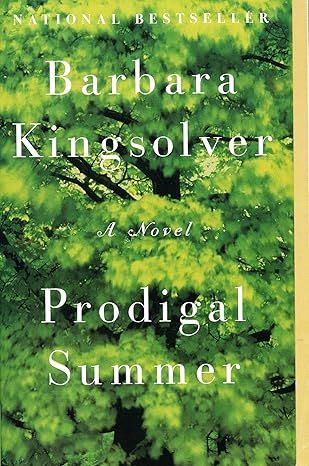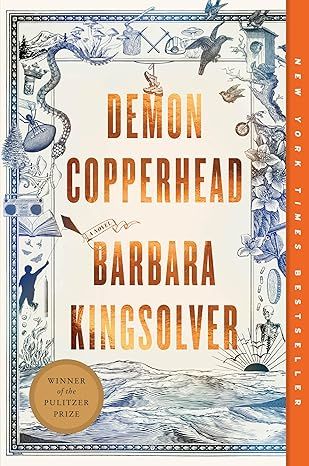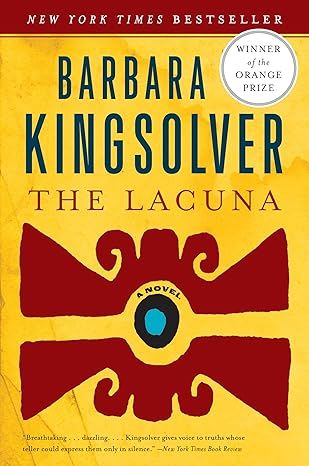The Lacuna: A Novel (P.S.)
4.4
-
4,450 ratings
New York Times Bestseller • A Best Book of the Year: New York Times, Chicago Tribune, San Francisco Chronicle, Seattle Times, and Kansas City Star• Winner of the Orange Prize
“Breathtaking. . . dazzling.” — New York Times Book Review
“Her best novel yet. . . both epic and deeply personal. . . . This is thought-provoking, and potentially thought-changing, historical fiction at its best.” — Dallas Morning News
In this powerfully imagined, provocative novel, Pulitzer Prize-winning author Barbara Kingsolver takes us on an epic journey from the Mexico of artists Diego Rivera and Frida Kahlo to the America of Pearl Harbor, FDR, and J. Edgar Hoover. The Lacuna is the poignant story of a man pulled between two nations as well as an unforgettable portrait of the artist—and of art itself.
Born in the United States, raised in Mexico, Harrison Shepherd lacks a sense of home in either. Life is whatever he learns from housekeepers who put him to work in the kitchen; from errands he runs in the streets; and, one fateful day, by mixing plaster for famed Mexican muralist Diego Rivera. He discovers a passion for Aztec history and the exotic, imperious artist Frida Kahlo, who will become his lifelong friend. When he goes to work for Lev Trotsky, an exiled political leader fighting for his life, Shepherd inadvertently casts his lot with art and revolution, newspaper headlines and howling gossip, and a risk of terrible violence.
Meanwhile, to the north, the United States will soon be caught up in the internationalist goodwill of World War II. There, in the land of his birth, Shepherd believes he might remake himself in America’s hopeful image and claim a voice of his own. Through darkening years, political winds continue to toss him between north and south in a plot that turns many times on the unspeakable breach—the lacuna—between truth and public presumption.
With deeply compelling characters, a vivid sense of place, and a clear grasp of how history and public opinion can shape a life, Kingsolver has created a rich and daring work of literature, establishing its author as one of the most provocative and important of her time.
Read more
Kindle
$14.99
Available instantly
Audiobook
$0.00
with membership trial
Hardcover
$1.77
Paperback
$9.99
Ships from
Amazon.com
Payment
Secure transaction
ISBN-10
0060852585
ISBN-13
978-0060852580
Print length
544 pages
Language
English
Publisher
Harper Perennial
Publication date
July 19, 2010
Dimensions
1.3 x 5.2 x 7.9 inches
Item weight
1.25 pounds
Product details
ASIN :
B002SVQCRO
File size :
1807 KB
Text-to-speech :
Enabled
Screen reader :
Supported
Enhanced typesetting :
Enabled
X-Ray :
Enabled
Word wise :
Enabled
Editorial reviews
From Publishers Weekly
Starred Review. Kingsolver's ambitious new novel, her first in nine years (after the The Poisonwood Bible), focuses on Harrison William Shepherd, the product of a divorced American father and a Mexican mother. After getting kicked out of his American military academy, Harrison spends his formative years in Mexico in the 1930s in the household of Diego Rivera; his wife, Frida Kahlo; and their houseguest, Leon Trotsky, who is hiding from Soviet assassins. After Trotsky is assassinated, Harrison returns to the U.S., settling down in Asheville, N.C., where he becomes an author of historical potboilers (e.g., Vassals of Majesty) and is later investigated as a possible subversive. Narrated in the form of letters, diary entries and newspaper clippings, the novel takes a while to get going, but once it does, it achieves a rare dramatic power that reaches its emotional peak when Harrison wittily and eloquently defends himself before the House Un-American Activities Committee (on the panel is a young Dick Nixon). Employed by the American imagination, is how one character describes Harrison, a term that could apply equally to Kingsolver as she masterfully resurrects a dark period in American history with the assured hand of a true literary artist. (Nov.) Copyright © Reed Business Information, a division of Reed Elsevier Inc. All rights reserved.
From Bookmarks Magazine
The Lacuna contains two very distinct parts. One features a vibrant Mexican landscape with the equally colorful personalities of Rivera, Kahlo, and Trotsky. The other centers more on Harrison's reclusive existence in small-town America and his battle with the House Un-American Activities Committee. Despite the prodigious research that both parts exhibit, critics clearly preferred the former, marveling at Kingsolver's lyrical passages and her expert recreation of 1930s Mexico. A few reviewers also noted instances of sermonizing and inaccurate history. However, the novel's compelling, engrossing story certainly outweighed these minor complaints, and in the end, Kingsolver has created a convincing "tableau vivant of epochs and people that time has transformed almost past recognition" (New York Times Book Review).
Read more
Sample
PART 1
Mexico, 1929–1931
(VB)
Isla Pixol, Mexico, 1929
In the beginning were the howlers. They always commenced their bellowing in the first hour of dawn, just as the hem of the sky began to whiten. It would start with just one: his forced, rhythmic groaning, like a saw blade. That aroused others near him, nudging them to bawl along with his monstrous tune. Soon the maroon-throated howls would echo back from other trees, farther down the beach, until the whole jungle filled with roaring trees. As it was in the beginning, so it is every morning of the world.
The boy and his mother believed it was saucer-eyed devils screaming in those trees, fighting over the territorial right to consume human flesh. The first year after moving to Mexico to stay at Enrique’s house, they woke up terrified at every day’s dawn to the howling. Sometimes she ran down the tiled hallway to her son’s bedroom, appearing in the doorway with her hair loose, her feet like iced fish in the bed, pulling the crocheted bedspread tight as a web around the two of them, listening.
It should have been like a storybook here. That is what she’d promised him, back in the cold little bedroom in Virginia North America: if they ran away to Mexico with Enrique she could be the bride of a wealthy man and her son would be the young squire, in a hacienda surrounded by pineapple fields. The island would be encircled with a shiny band of sea like a wedding ring, and somewhere on the mainland was its gem, the oil fields where Enrique made his fortune.
But the storybook was The Prisoner of Zenda. He was not a young squire, and his mother after many months was still no bride. Enrique was their captor, surveying their terror with a cool eye while eating his breakfast. “That howling is the aullaros,” he would say, as he pulled the white napkin out of its silver ring into his silver-ringed fingers, placing it on his lap and slicing into his breakfast with a fork and knife. “They howl at one another to settle out their territories, before they begin a day of hunting for food.”
Their food might be us, mother and son agreed, when they huddled together inside the spiderweb of bedspread, listening to a rising tide of toothsome roars. You had better write all this in your notebook, she said, the story of what happened to us in Mexico. So when nothing is left of us but bones, someone will know where we went. She said to start this way: In the beginning were the aullaros, crying for our blood.
Enrique had lived his whole life in that hacienda, ever since his father built it and flogged the indios into planting his pineapple fields. He had been raised to understand the usefulness of fear. So it was nearly a year before he told them the truth: the howling is only monkeys. He didn’t even look across the table when he said it, only at the important eggs on his plate. He hid a scornful smile under his moustache, which is not a good hiding place. “Every ignorant Indian in the village knows what they are. You would too, if you went out in the morning instead of hiding in bed like a pair of sloths.”
It was true: the creatures were long-tailed monkeys, eating leaves. How could such a howling come from a thing so honestly ordinary? But it did. The boy crept outdoors early and learned to spot them, high in the veil of branches against white sky. Hunched, woolly bodies balanced on swaying limbs, their tails reaching out to stroke the branches like guitar strings. Sometimes the mother monkeys cradled little babes, born to precarious altitudes, clinging for their lives.
So there weren’t any tree demons. And Enrique was not really a wicked king, he was only a man. He looked like the tiny man on top of a wedding cake: the same round head with parted, shiny hair, the same small moustache. But the boy’s mother was not the tiny bride, and of course there is no place on that cake for a child.
When Enrique wanted to ridicule him after that, he didn’t even need to mention devils, he only rolled his eyes up at the trees. “The devil here is a boy with too much imagination,” he usually said. That was like a mathematics problem, it gave the boy a headache because he couldn’t work out which was the wrong part of the equation: being a Boy, or being Imaginative. Enrique felt a successful man needed no imagination at all.
Here is another way to begin the story, and this one is also true.
The rule of fishes is the same as the rule of people: if the shark comes, they will all escape, and leave you to be eaten. They share a single jumpy heart that drives them to move all together, running away from danger just before it arrives. Somehow they know.
Underneath the ocean is a world without people. The sea-roof rocks overhead as you drift among the purple trees of the coral forest, surrounded by a heavenly body of light made of shining fishes. The sun comes down through the water like flaming arrows, touching the scaly bodies and setting every fin to flame. A thousand fishes make the school, but they always move together: one great, bright, brittle altogetherness.
It’s a perfect world down there, except for the one of them who can’t breathe water. He holds his nose, dangling from the silver ceiling like a great ugly puppet. Little hairs cover his arms like grass. He is pale, lit up by watery light on prickled boy skin, not the scaled slick silver merman he wants to be. The fish dart all around him and he feels lonely. He knows it is stupid to feel lonely because he isn’t a fish, but he does. And yet he stays there anyway, trapped in the below-life, wishing he could dwell in their city with that bright, liquid life flowing all around him. The glittering school pulls in at one side and pushes out the other, a crowd of specks moving in and out like one great breathing creature. When a shadow comes along, the mass of fish darts instantly to its own center, imploding into a dense, safe core, and leaving the boy outside.
How can they know to save themselves, and leave him to be eaten? They have their own God, a puppet master who rules their one-fish mind, holding a thread attached to every heart in their crowded world. All the hearts but one.
The boy discovered the world of the fishes after Leandro gave him a diving goggle. Leandro, the cook, took pity on the flutie boy from America who had nothing to do all day but poke around in the cliffs along the beach, pretending to hunt for something. The goggle had glass lenses, and was made with gum rubber and most of the parts of an airman’s goggle. Leandro said his brother used it when he was alive. He showed how to spit in it before putting it on, so it wouldn’t go foggy.
“Andele. Go on now, get in the water,” he said. “You will be surprised.”
The pale-skinned boy stood shivering in water up to his waist, thinking these were the most awful words in any language: You will be surprised. The moment when everything is about to change. When Mother was leaving Father (loudly, glasses crashing against the wall), taking the child to Mexico, and nothing to do but stand in the corridor of the cold little house, waiting to be told. The exchanges were never good: taking a train, a father and then no father. Don Enrique from the consulate in Washington, then Enrique in Mother’s bedroom. Everything changes now, while you stand shivering in the corridor waiting to slip through one world into the next.
And now, at the end of everything, this: standing waist-deep in the ocean wearing the diving goggle, with Leandro watching. A pack of village boys had come along too, their dark arms swinging, carrying the long knives they used for collecting oysters. White sand caked the sides of their feet like pale moccasins. They stopped to watch, all the swinging arms stopped, frozen in place, waiting. There was nothing left for him to do but take a breath and dive into that blue place.
And oh God there it was, the promise delivered, a world. Fishes mad with color, striped and dotted, golden bodies, blue heads. Societies of fish, a public, suspended in its watery world, poking pointed noses into coral. They pecked at the pair of hairy tree trunks, his legs, these edifices that were nothing to them but more landscape. The boy got a bit of a stiffy, he was that afraid, and that happy. No more empty-headed bobbing in the sea, after this. No more believing in an ocean with nothing inside but blue water.
He refused to come out of the sea all day, until the colors began to go dark. Luckily his mother and Enrique had enough to drink, sitting on the terrace with the men from America turning the air blue with their cigars, discussing the assassination of Obregón, wondering who would now stop the land reforms before the indios took everything. If not for so much mezcal and lime, his mother might have grown bored with the man-talk, and thought to wonder whether her son had drowned.
It was only Leandro who wondered. The next morning when the boy walked out to the kitchen pavilion to watch breakfast cooking, Leandro said, “Pícaro, you’ll pay. A man has to pay for every crime.” Leandro had worried all afternoon that the goggle he brought to this house had become an instrument of death. The punishment was waking up with a sun-broilt spot the size of a tortilla, hot as fire. When the criminal pulled up his nightshirt to show the seared skin on his back, Leandro laughed. He was brown as coconuts, and hadn’t thought of sun burn. But for once he didn’t say usted pagará, in the formal language of servants to masters. He said tú pagarás, you will pay, in the language of friends.
The criminal was unrepentant: “You gave me the goggle, so it’s your fault.” And went back into the sea again for most of that day, and burnt his back as crisp as fat rinds in a kettle. Leandro had to rub lard on it that night, saying “Pícaro, rascal boy, why do you do such stupid things?” No seas malo, he said, the familiar “you,” language of friends, or lovers, or adults to children. There is no knowing which.
On Saturday night before Holy Week, Salomé wanted to go into town to hear the music. Her son would have to go too, as she needed an elbow to hang upon while walking around the square. She preferred to call him by his middle name, William or just Will, conditioned as that is on future events: You will. Though on her tongue of course it sounded like wheel, a thing that serves, but only when in motion. Salomé Huerta was her name. She had run away at a young age to become an American Sally, and then Sally Shepherd for a while, but nothing ever lasted long. American Sally was finished.
This was the year of Salomé pouting, her last one in the hacienda on Isla Pixol, though no one knew it yet. That day she had pouted because Enrique had no intention of walking around with her on the zocalo, just to show off a frock. He had too much work to do. Work meant sitting in his library running both hands through his slick hair, drinking mezcal, and sweating through his collar while working out colonnades of numbers. By this means he learned whether he had money up to his moustache this week, or only up to his bollocks.
Salomé put on the new frock, painted a bow on her mouth, took her son by the arm and walked to town. They smelled the zocalo first: roasted vanilla beans, coconut milk candies, boiled coffee. The square was packed with couples walking entwined, their arms snaking around one another like the vines that strangle tree trunks. The girls wore striped wool skirts, lace blouses, and their narrow-waisted boyfriends. The mood of the fiesta was enclosed in a perfect square: four long lines of electric bulbs strung from posts at the corners, fencing out a bright piece of night just above everyone’s heads.
Lit from below, the hotel and other buildings around the square had eyebrow-shaped shadows above their iron balconies. The little cathedral looked taller than it was, and menacing, like a person who comes into the bedroom carrying a candle. The musicians stood in the little round belvedere whose pointed roof and wrought-iron railings were all freshly painted white along with everything else, including the giant old fig trees around the square. Their trunks blazed in the darkness, but only up to a certain point, as if a recent flood of whitewash through town had left a high-water mark.
Salomé seemed happy to float with the moving river of people around the square, even though in her elegant lizard-skin shoes and flapper crepe that showed her legs, she looked like no other person there. The crowd parted for her. Probably it pleased her to be the green-eyed Spaniard among the Indians, or rather, the Criolla: Mexican-born but pure nonetheless, with no Indian blood mixed in. Her blue-eyed, half-American son was less pleased with his position, a tall weed growing among the broad-faced townspeople. They would have made a good illustration for a book showing the Castes of the Nation, as the schoolbooks did in those days.
“Next year,” Salomé said in English, pinching his elbow with her fierce crab claws of love, “you’ll be here with your own girl. This is the last Noche Palmas you’ll want to walk around here with your old wrinkle.” She liked using American slang, especially in crowds. “This is posalutely the berries,” she would announce, putting the two of them inside an invisible room with her words, and closing the door.
“I won’t have a girlfriend.”
“You’ll turn fourteen next year. You’re already taller than President Portes Gil. Why wouldn’t you have a girlfriend?”
“Portes Gil isn’t even a real president. He only got in because Obregón was iced.”
“And maybe you will likewise ascend to power, after some girl’s first novio gets the sack. Doesn’t matter how you get the job, ducky. She’ll still be yours.”
“Next year you could have this whole town, if you want it.”
“But you’ll have a girl. This is all I’m saying. You’ll go off and leave me alone.” It was a game she played. Very hard to win.
“Or if you don’t like it here, Mother, you could go somewhere else. Some smart city where people have better entertainments than walking in circles around the zocalo.”
“And,” she persisted, “you’d still have the girl.” Not just a girl but the girl, already an enemy.
“What do you care? You have Enrique.”
“You make him sound like a case of the pox.”
In front of the wrought-iron bandstand, the crowd had cleared a space for dancing. Old men in sandals held stiff arms around their barrel-shaped wives.
“Next year, Mother, no matter what, you won’t be old.”
She rested her head against his shoulder as they walked. He had won.
Salomé hated that her son was now taller than she was: the first time she noticed, she was furious, then morose. In her formula of life, this meant she was two-thirds dead. “The first part of life is childhood. The second is your child’s childhood. And then the third, old age.” Another mathematics problem with no practical solution, especially for the child. Growing backward, becoming unborn: that would have been just the thing.
They stopped to watch the mariachis on the platform, handsome men with puckered lips giving long kisses to their brass horns. Trails of silver buttons led down the sides of their tight black trousers. The zocalo was jammed now; men and women kept arriving from the pineapple fields with the day’s dust still on their feet, shuffling out of the darkness into the square of electric light. In front of the flat stone breast of the church, some of them settled in little encampments on the bare earth, spreading blankets where a mother and father could sit with their backs against the cool stones while babies slept rolled in a pile. These were the vendors who walked here for Holy Week, each woman wearing the particular dress of her village. The ones from the south wore strange skirts like heavy blankets wrapped in pleats, and delicate blouses of ribbon and embroidery. They wore these tonight and on Easter and every other day, whether attending a marriage or feeding pigs.
They had come here carrying bundles of palm leaves and now sat untying them, pulling apart the fronds. All night their hands would move in darkness to weave the straps of leaf into unexpected shapes of resurrection: crosses, garlands of lilies, doves of the Holy Spirit, even Christ himself. These things had to be made by hand in one night, for the forbidden Palm Sunday mass, and burned afterward, because icons were illegal. Priests were illegal, saying the mass was illegal, all banned by the Revolution.
Earlier in the year the Cristeros had ridden into town wearing bullets strapped in rows like jewelry across their chests, galloping around the square to protest the law banning priests. The girls cheered and threw flowers as if Pancho Villa himself had risen from the grave and located his horse. Old women rocked on their knees, eyes closed, hugging their crosses and kissing them like babies. Tomorrow these villagers would carry their secret icons into the church without any priest and light the candles themselves, moving together in single-minded grace. Like the school of the fish, so driven to righteousness they could flout the law, declare the safety of their souls, then go home and destroy the evidence.
It was late now, the married couples had begun to surrender dancing space to a younger group: girls with red yarn braided into their hair and wound around their heads into thick crowns. Their white dresses swirled like froth, with skirts so wide they could take the hems in their fingertips and raise them up to make sudden wings, like butterflies, fluttering as they turned. The men’s high-heeled boots cut hard at the ground, drumming like penned stallions. When the music paused, they leaned across their partners in the manner of animals preparing to mate. Move away, come back, the girls waggled their shoulders. The men put handkerchiefs under their arms, then waved them beneath the girls’ chins.
Salomé decided she wanted to go home immediately.
“We would have to walk, Mother. Natividad won’t come for us until eleven, because that’s what you told him.”
“Then we’ll walk,” she said.
“Just wait another half hour. Otherwise we’ll be walking in the dark. Bandits might murder us.”
“Nobody will murder us. The bandits are all in the zocalo trying to steal purses.” Salomé was practical, even as a hysteric.
“You hate to walk.”
“What I hate is watching these primitives showing off. A she-goat in a dress is still a she-goat.”
Darkness fell down on everything then, like a curtain. Someone must have shut off the lights. The crowd breathed out. The butterfly girls had set glasses with lighted candles onto their braid-crowned heads. As they danced, their candles floated across an invisible surface like reflections of the moon across a lake.
Salomé was so determined to walk home, she had already started in the wrong direction. It wasn’t easy to overtake her. “Indian girls,” she spat. “What kind of man would chase after that? A corn-eater will never be any more than she is.”
The dancers were butterflies. From a hundred paces Salomé could see the dirt under these girls’ fingernails, but not their wings.
Enrique was confident the oil men would come to an agreement. But it could take some time. The oil men had come to Isla Pixol with their wives; they all took rooms in town. Enrique tried to persuade them to stay at the hacienda, since the advantages of his hospitality might work in his favor in the negotiations. “That hotel was built before the flood of Noah. Have you seen the elevator? A birdcage hanging from a watch chain. And the rooms are smaller than a cigar tin.”
Salomé shot her eyes at him: How would he know that?
The wives wore bobbed hair and smart frocks, but all had entered the third of what Salomé called the Three Portions of Life. Possibly, they’d entered the fourth. After dinner, while the men smoked Tuxtlan cigars in the library, the women stood outside in point-heeled shoes on the tiled terrace with their little hats pinned against the wind and cheek-curls plastered down. Holding glasses of vino tinto, they gazed across the bay, speculating about the silence under the sea. “Seaweeds swaying like palm trees,” they all agreed, “quiet as the grave.”
The boy who sat on the low wall at the edge of the terraza thought: These budgies would be disappointed to know, it’s noisy as anything down there. Strange, but not quiet. Like one of the mysterious worlds in Jules Verne’s books, filled with its own kinds of things, paying no attention to ours. Often he shook the bubbles from his ears and just listened, drifting along, attending the infinite chorus of tiny clicks and squeaks. Watching one fish at a time as it poked its own way around the coral, he could see it was talking to the others. Or at any rate, making noises at them.
“What is the difference,” he asked Leandro the next day, “between talking and making a noise?”
Salomé hadn’t yet learned Leandro’s name, she called him “the new kitchen boy.” The last galopina was a pretty girl, Ofelia, too much admired by Enrique, given the sack by Salomé. Leandro took up more space, standing with bare feet set apart, steady as the stuccoed pillars supporting the tile roofs above the walkways of this yellow-ochre house. A row of lime trees in large terra-cotta pots lined the breezeway between the house and kitchen pavilion. And like a tree, Leandro was planted there for most of each day, cutting up chayotes with his machete on the big work table. Or peeling shrimps, or making sopa de milpa: corn kernel soup with diced squash blossom and avocado. Xochitl soup, with chicken and vegetables in broth. Salads of cactus nopales with avocado and cilantro. The rice he made with a hint of something sweet in it.
Every day he said, You could pick up that knife and stop being a nuisance. But smiling, not the way Salomé said “nuisance.” Not the way she said, “If you come in here with those sandy feet your name is mud.”
Regarding the difference between talk and noise, Leandro said, “Ca depende.”
“Depends on what?”
“On intention. Whether he wants another fish to understand his meaning.” Leandro considered his pile of shrimps solemnly, as if they might have had a last wish prior to execution. “If the fish only wants to show he is there, it’s a noise. But maybe the fish-clicks are saying ‘Go away,’ or ‘My food, not yours.’”
“Or, ‘Your name is mud.’”
Leandro laughed, because in Spanish it sounds funny: Su nombre es lodo.
“Exacto,” Leandro said.
“Then to another fish, it’s talk,” the boy said. “But to me it’s only noise.”
Leandro needed help—too many mouths to feed in this house, the Americans liked to eat. Also it was Salomé’s birthday, and she wanted squid. The oil men’s wives’ eyes would swing like the pendulum of a clock beneath their cloche hats when they saw squid a la Veracruzana. But the men would eat tentacles without noticing, enthralled with their own stories. How their hired guns had put down the rebellion in Sonora and sent Escobar running like a dog. The more mezcal went into their glasses, the faster Escobar ran.
After supper Leandro said El flojo trabaja doble, the lazy man has to work double, because the boy tried to carry all the dishes to the kitchen at once. He dropped two white plates on the tile, shattering them all to buttons. So Leandro was right—sweeping up took twice as long as making an extra trip. But Leandro came out and helped pick up the mess, kneeling beneath the Americans’ gaze as they commiserated on the clumsiness of servants, here is one thing that’s the same in every country.
Afterward Salomé tried to get them all to cut a rug. She cranked up the Victrola and waved the mezcal bottle at the men, but they went to bed, leaving her fluttering around the parlor like a balloon of air, let go. It was her birthday, and not even her son to whom she had given life would cut a rug with her. “For God’s sake, William, you’re tedious,” she diagnosed. Nose in the books, you’re nothing but a canceled stamp. Flutie, green apples, wet blanket, this is only a small sample of the names that came to mind when Salomé was stewed to the hat. He did try to dance with her after that, but it was too late. She couldn’t hold herself up on her own stilts.
Salomé is airtight, the men liked to say. Copacetic, the cat’s meow, a snake charmer. Also a fire bell. One of the oil men said that to his wife, when the others were outside. Explaining the situation. Fire bell meant still married, to the husband in America. After all this time not divorced, some poor sod in D.C., an administration accountant. She had the affair right under his nose with this Mexican attaché, she couldn’t have been more than twenty-five at the time, and with that child already. Left the other fellow flat. Be careful of this fancy Salomé, he warned his wife. She’s a disappearing act.
On Cinco de Mayo the village celebrated with fireworks, commemorating the victory over Napoleon’s invasion in the battle at Puebla. Salomé had a headache, one last gift from the night before, and spent the day in her little bedchamber at the end of the hall. She called it Elba, her place of exile. Lately Enrique had been retiring early and closing the heavy door to his own bedroom. Today she was in no mood for noise. Today, she complained, they were making more explosions in the campo than it probably took to scare off Napoleon’s army in the first place.
The boy did not walk into town for the celebration. He knew that in the long run Napoleon’s generals still came back and cuffed Santa Ana, and took over Mexico long enough to make everyone speak French and wear tight pants until 1867, or something near it. He was supposed to finish the book on Emperor Maximiliano, from Enrique’s library. That was Salomé’s program for him, Reading Moldy Books, because there was no school in Isla Pixol suitable for a boy who was already taller than President Portes Gil. But the best place for reading was in the forest, not the house. Under a tree by the estuary, twenty minutes’ walk down the trail. And the book on Maximiliano was enormous. So it only made sense to carry The Mysterious Affair at Styles instead.
The biggest amate tree had buttresses like sails reaching out from the trunk, dividing out little rooms furnished with drapes of fern and patchouli. A rooming house for dragonflies and ant thrushes, and once, a coiled little snake. Many trees in that jungle were as broad around their bases as the huts in Leandro’s village, and held their branches too high to see. There was no knowing what lived up there. Once the saucer-eyed devils had howled for blood, but maybe those branches were only the balconies of monkey hotels, and nesting places for oropéndola birds, whose gurgling song sounded like water bubbling out of a tin canteen.
In Enrique’s library, every wall was covered with wooden cabinets. The room had no windows, only shelves, and all the book cabinets had iron grilles covering their fronts like prisoners’ windows, locked over shelves packed with books. The square openings between the welded bars were just large enough for a fine-boned, long-fingered boy to put his hand through, like slipping on an iron bracelet. He could reach in and touch the books’ spines, exactly as Count Dantès in The Count of Monte Cristo had reached through the bars to touch his bride’s face, when she came to see him in prison. Carefully he could slide one book from its place in the packed shelf, and with both hands put through the bars he could turn and examine it, sometimes even open it, if the shelf were deep enough. But not remove it. The grilles had iron padlocks.
Every Sunday Enrique brought out the skeleton key, unlocked the case, and took out four books exactly, which he left in a pile on the table without discussion. Invariably historical, stinking of mold, these were to be a boy’s education. A few were all right, Zozobra, and also Romancero Gitano, poems by a young man who loved gypsies. Cervantes held promise, but had to be puzzled out in some ancient kind of Spanish. One week only with Don Quixote, before turning him in to be locked up again and exchanged for a new week’s pile, had felt like a peek through a keyhole.
And anyhow not a single one of those books could hold eight minutes to Agatha Christie or the others he’d brought from before, when they came here on the train. His mother had let him carry two valises: one for books, one for clothes. The clothes were a waste, outgrown instantly. He should have filled both with books. The Mysterious Affair at Styles, The Count of Monte Cristo, Around the World in Eighty Days, Twenty Thousand Leagues Under the Sea, books in English that didn’t stink of mold. He’d already read most of them now, more than once. The Three Musketeers still called out to him, waving their swords, but he always shoved them back in the valise. Because what would be left, when all these books were in the past? He lay awake nights dreading it.
The program of a real school was vague in Salomé’s convictions, and frankly in his own: dank memories of wool coats and rough boys, and sport, a terrible thing, daily enforced. One lady in a brown sweater used to give him books to keep, that was the best thing he recalled from home. But that is not what we call home now, Salomé said, “We’re here and there isn’t a school so you’ll just have to read every book in that damned library, if we’re allowed to stay.” If not, her program became less certain.
The library often stank, from the oil men in there smoking Tuxtlan cigars all night. Salomé hated all of it: cigars, men talking. Also locked-up books, or any other kind it seemed, and flutie boys who read them too much. But even so, she bought him a notebook from the shop by the ferry docks, on the day they’d tried to run away from Enrique and cried because of having absolutely nowhere to go. She sat limp on the iron bench in her silk-crepe dress, shoulders shaking, for such a long time he’d had to wander over to the window of the tobacco stand and leaf through magazines. There he’d found the pasteboard notebook: the most beautiful book ever, it could become anything.
She came up behind him while he was looking at it. Set her chin on top of his shoulder, wiped her cheek with the back of a hand, and said, “We’ll take it, then.” The man wrapped it carefully in brown paper, tied with a string.
That was the story she had wanted him to begin, to tell what happened in Mexico before the howlers swallowed them down without a trace. Later on, many times, she would change her mind and tell him to stop writing. It made her nervous.
At the end of that day, after running away, buying a notebook, and eating boiled shrimps from a paper cone while standing on the pier watching ferries leave, they’d gone back to Enrique, of course. They were prisoners on an island, like the Count of Monte Cristo. The hacienda had heavy doors and thick walls that stayed cool all day, and windows that let in the sound of the sea all night: hush, hush, like a heartbeat. He would grow thin as bones here, and when the books were all finished, he would starve.
But no, now he would not. The notebook from the tobacco stand was the beginning of hope: a prisoner’s plan for escape. Its empty pages would be the book of everything, miraculous and unending like the sea at night, a heartbeat that never stops.
Salomé for her part was not worried about running out of books, only of having her clothes go out of fashion. You can’t buy a thing on this island. Unless he wants me to be a she-goat, wear skirts down to the ground. A trunk with her nicest things had been mailed overland from Washington, D.C., last year, according to the lawyer who was supposed to be taking care of these matters. But both the trunk and the divorce seemed to have lost their way. Enrique said they might see that trunk one day, ojalá, if the Lord is willing. Meaning if the Lord is not, the Zapatistas held up the train and took everything. The boy cried, “Oh yes, imagine it! The Zapatistas in their gun belts, reading Miss Agatha Christie by the campfire. Eating off Mother’s Limoges and wearing her dressing gowns.”
Enrique pinched his moustache and said, “Imagine it! Too bad you can’t sell daydreams like that for money.”
“Revolution in Mexico is a fashion,” he announced to the oil men at supper on their last night. “Like the silly hats worn by our wives. I don’t care what they told you in Washington, this country will work hard for the foreign dollar.” He raised his glass. “The heart of Mexico is like that of a loyal woman, married forever to Porfirio Díaz.”
The deal was made, the oil men went away. The next morning Enrique let Salomé sit on his lap at breakfast and give him a kiss like a trumpet player. A sign of progress, she declared, after he’d gone out to inspect a new packing house. “Did you hear him say that, hats worn by our wives?” Her first project now was to get herself moved back into his bedroom. Her second one was to fire his maid.
The boy’s best plan on any day was to make himself scarce. Walk out the back through the kitchen, down a long lane of mulata trees with red skin peeling away from their trunks, exposing smooth black skin underneath. Cut across the sand trail through the pineapple field, over the low rock wall out to the sea, carrying a rucksack with a book and a packet of tortillas for lunch, the diving goggle and a bathing costume. No one would see but Leandro, whose eyes following him down the sand trail could make him feel naked when he was not. Leandro, who came barefoot up the lane every morning carrying the smoky smell of breakfast fires from his village, but wearing a clean shirt laundered by his wife. Salomé said Leandro already had a wife, a child, and a baby. As young as he is, she clucked, happy that someone had wrecked his life even faster than she had wrecked hers. If Leandro was already in the Second Portion of Life (the part with children), it was going to be short.
Out on the reef, the fish came every day for the scraps of tortilla the boy brought from the kitchen and tore into pieces, casting his bread upon the waters. One fish had a mouth like a parrot’s beak and a fire-red belly, and was always the first in line to come banging up for the day’s handout. So really it wasn’t a friend. It was like the men who came to visit for the free eats and their eyes full of Salomé in a V-neck satin dress.
Salomé formulated her plan of attack. First, she instructed Leandro, we make only Enrique’s favorite foods every day. Starting with breakfast: cinnamon-flavored coffee, tortillas warm from the griddle, pineapple with ham, and what she called Divorced Eggs, two of them crowded onto a plate, one with mild red salsa and one with spicy green. Salomé maintained her own perspective on romance.
The kitchen was connected to the house by the passageway of lime trees. It had low brick walls, planks for work counters, and was open all around to the sea air so smoke could escape from the firebox of the brick stove. Posts in the corners held up the roof, and the brick bread oven hunched in one corner. Natividad, the oldest servant, who was nearly blind, came out every dawn to sweep out the firebox and light it again, feeling his way to the flame, laying the sticks side by side like tucking children to bed.
When Leandro came he would push the fire to the sides, keeping the heat away from the center of the heavy iron griddle. He mopped the griddle with a rag dipped in the lard jar so the tortillas wouldn’t stick. Next to the lard jar he kept a big bowl of sticky corn dough, pinching up balls of it and pressing them flat by hand. The heat made a necklace of black pearls on each white tortilla as it cooked. In the thick ones, the gorditas, he cut ridges as they cooked, for holding the bean paste. But for empanadas he made them thin, folding the tortilla over the filling and sliding it into a pan of hot grease.
Most of all, Enrique cared for pan dulces made with wheat-flour dough. Puffy and soft with a grit of coarse sugar on top, filled with pineapple, sweet and tart from the oven’s wood smoke. Many a cook had been fired by Enrique, before this Leandro arrived from heaven. Pan dulce is no easy trick. The vanilla has to be from Papantla. The flour is ground in a stone metate. Not like masa for tortillas, corn soaked in lime water that’s ground up coarse and wet. Any Mexican can do that, Leandro said. Dry flour for European bread is a different matter. It has to be ground so fine it comes up into the air in clouds. The hard part was mixing in the water, going too fast. Dumping water on the flour in a cold gush, causing a catastrophe of lumps.
“Dios mio, what have you done there?”
The boy’s excuse: the bucket was too heavy.
“Flojo, you’re as tall as I am, you can lift the bucket.”
The dough had to be thrown away, and everything started over. Leandro from heaven, angel of patience, paused to rinse his hands in the wash bucket and dry them on his white trousers. Let me show you how to do this. Begin with two kilos of the flour. Make a mountain on the counter. Into this mound, with your fingers, crumble the flakes of butter, the salt and soda. Then pull it out like a ring of volcanic mountains around a crater. Pour a lake of cold water in the center. Little by little, pull the mountains into the lake, water and shore together, into a marsh. Gradually. No islands. The paste swells until there are no mountains left, and no lake, only a great blob of lava.
“There. Not just any Mexican can do that, muchacho.”
Leandro flopped the dough over gently on the counter until it was smooth, fluid and solid at the same time. It would sleep overnight in a covered bowl. In the morning he would roll it flat, cut it with a machete into squares, spoon a dot of pineapple filling on each one, and fold it in a triangle, sprinkled with sugar grains soaked in vanilla. “Now you know the secret for making the boss happy,” Leandro said. “Cooking in this house is like war. I am the capitan of bread and you are my sergente mayor. If he throws out your mother you might still have a job, if you can make pan dulce and blandas.”
“Which are the blandas?”
“Sergente, you can’t make this kind of mistake. Blandas are the big soft ones he’s crazy for. Tortillas big enough to wrap a baby in, soft as an angel’s wings.”
“Si, señor!” The tall boy saluted. “Big enough to wrap angels in, soft as a baby’s crupper.”
Leandro laughed. “Small angels,” he said. “Only baby ones.”
On the twenty-first of June, 1929, a giant iguana climbed up the mango by the patio, causing Salomé to stand up from her lunch and scream. And on that day the Three Years Silence ended, though the iguana had nothing to do with it.
It was a declaration signed by the president, ending the three-year ban on saying the mass. The war with the Cristeros ended. The church bells rang all day on Sunday, calling back the priests with their gold rings, landholdings, and sovereignty intact. Enrique took it as proof: Mexico falls on her knees at the altar, ready to return to the days of Porfirio Díaz. True Mexicans will always understand the virtues of humility, piety, and patriotism. “And decent women,” he added pointedly to Salomé, quoting Díaz: “Only in her home, like a butterfly in a glass jar, can woman progress to her highest level of decency.” He expected her to take herself and her son to town for the Reconciliation Mass.
“If he wants a butterfly, he should let me stay home in his damn glass jar,” she fumed in the carriage on the way to church. Salomé was all for the Three Years Silence. In her opinion the mass could only be more tedious if they made you wear cotton stockings. She too had lived under the reign of Porfirio, ruled by a dark supremacy of nuns who showed no mercy to a businessman’s cheeky daughter who came to school with her ankles showing. Salomé had maneuvered a miraculous escape, like the Count of Monte Cristo: a study tour in America, where she enlisted a claims accountant in her father’s firm who was helpless before her charms. She’d solved the mathematical problem of age sixteen by saying she was twenty. At twenty-four she’d said the same thing again, balancing the equation. She became Sally, confirmed in the church of expediency. Even now, as they approached the cathedral in town, she rolled her eyes and said, “Opium of the masses,” parroting the men in government who’d tried to rout the priests. But she didn’t say it in Spanish, for the driver to hear.
The cathedral was packed with solemn children, farmers, and old women on tree-trunk legs. Some worked their way through the Stations of the Cross, orbiting around the crowd’s periphery as deliberately as planets. A long line of townspeople waited to receive communion, but Salomé walked to the head of the line, accepting the host on her tongue as if this were a bakery line and she had plenty of other errands.
The priest wore gold brocades and a pointed hat. He had managed to keep his clothes very nice, during his three years hiding out. All eyes followed him like plants facing light, except for those of Salomé. She left as soon as possible and walked straight for the carriage, snapping at Natividad to get going, fiercely digging in her beaded bag for her aspirins. Everything about Salomé came from a jar or a bottle: first, the powder and perfume, the pomade for her marcel wave. Next, the headache, from a bottle of mezcal. Then the cure, from a bottle of Bellans Hot-Water-Relief. Maybe some other bottle gave her the flapper-dancing, crank-up-the-Victrola Twenty-Three Skidoo. Stashed under a table drape in her room, something to help her keep it up.
If Enrique didn’t love her, she now announced in the carriage, it was not her fault. She didn’t see how God was going to help any of this. Enrique’s mother didn’t approve of a divorcée, so that was one person to blame. And the servants, who did everything wrong. She would like to blame Leandro but couldn’t. The white-flour dough he made for the pastries was perfect, as silky as Salomé’s white dress that could be poured out of a pitcher, in which she still hoped to be married one more time.
The problem must be this long-legged son, bouncing with the bumps in the road, brushing hair out of his eyes, staring off at the ocean. No place on the top of the wedding cake for a boy already as tall as the president, who was not, himself, elected.
Read more
About the authors
Barbara Kingsolver
Barbara Kingsolver was born in 1955 and grew up in rural Kentucky. She earned degrees in biology from DePauw University and the University of Arizona, and has worked as a freelance writer and author since 1985. At various times she has lived in England, France, and the Canary Islands, and has worked in Europe, Africa, Asia, Mexico, and South America. She spent two decades in Tucson, Arizona, before moving to southwestern Virginia where she currently resides.
Her books, in order of publication, are: The Bean Trees (1988), Homeland (1989), Holding the Line: Women in the Great Arizona Mine Strike (1989), Animal Dreams (1990), Another America (1992), Pigs in Heaven (1993), High Tide in Tucson (1995), The Poisonwood Bible (1998), Prodigal Summer (2000), Small Wonder (2002), Last Stand: America's Virgin Lands, with photographer Annie Griffiths (2002), Animal, Vegetable, Miracle: A Year of Food Life (2007), The Lacuna (2009), Flight Behavior (2012), Unsheltered (2018), How To Fly (In 10,000 Easy Lessons) (2020), Demon Copperhead (2022), and coauthored with Lily Kingsolver, Coyote's Wild Home (2023). She served as editor for Best American Short Stories 2001.
Read more
Reviews
Customer reviews
4.4 out of 5
4,450 global ratings

E. Heard
5
A literary delight
Reviewed in the United States on December 3, 2009
Verified Purchase
"The Lacuna" is a fascinating journey told through journal entries, letters, and news clippings. I read about this book prior to purchasing it and wasn't sure I would enjoy the format. I have read stories told through journal entries before and never enjoyed them. But Barbara Kingsolver avoids the limitations of that style by inventing a character who writes as though he's living a novel. Harrison Shepherd seems more interested in the people around him than himself, rarely inserting himself into the action except when necessary, and then usually referring to himself in third person or by some self-deprecating nickname.
The story takes places in Mexico and in the United States, since Shepherd was born in the U.S. to an american father and mexican mother. His mother is perhaps a lesson in how not to be an example to a child. She is constantly searching for the man with the largest wallet, and she is entirely self-absorbed. She leaves Harrison's father for a bigger financial fish in Mexico, and the story begins there. Shepherd, from that point on, becomes a person of two nationalities, writing with love and disgust about the events and people he observes on both sides of the border. A central relationship he forms is with the famous artist, Frida Kahlo, who seems to serve as both big-sister and surrogate mother. He recognizes in Frida a person very much like himself, a person who feels alone in a crowded room.
Other historical characters given attention are Frida's husband Diego Riviera and Bolshevik revolution leader Leon Trotsky. Here I must give a warning-- if you are someone who absolutely cannot abide a sympathetic view of people who are communists, this is not the book for you. Harrison Shepherd spends a great deal of his time with Frida, Riviera, and Trotsky, becoming close to each of them in his own way. He is not so much fascinated by their politics as he is with their characters. He seems to not have an opinion one way or the other about communism or the huge implications of its effect on the world. Rather than discuss Trotsky's role in the upheaval of Russia, Shepherd seems more interested in how Trotsky deals with people and how he fusses over the chickens in the yard. Indeed, a major theme of the book involves viewing people for who they are rather than who they are reputed to be.
"The Lacuna", above all else, is a feast of beautiful words. It is a book from which you will find yourself reading passages aloud just to hear the words spoken. You might even hassle your spouse (as I did) to read this or that paragraph because it was written so beautifully. I don't think the story would have worked so well had it not been written in the way it was. It is not heavily plot-driven, but more character driven. If I have any criticism to make it would be that I wish the denouement had been longer. But given the structure of this novel, a longer ending may not have been plausible.
Overall it's a great read. I have been going back and rereading different parts of it since I finished it; something I rarely do with a book. I might even just read it all over again. :)
Read more
7 people found this helpful
mijcar
5
Kingsolver's Best Yet
Reviewed in the United States on May 20, 2010
Verified Purchase
If you browse these reviews, you will a smidgen of disparaging ones.
Some people claim the book is a challenging read (and didn't finish it). It is.
Some people found the relationships difficult to keep track of. They can be.
Some people found the book too long (they never finished it, either). It could be.
Some people found some of the Spanish incorrect. Yes, there are probably about half-a-dozen misspellings.
Some people thought there were too much use of the Spanish language. Perhaps, if you consider the fewer than a dozen untranslated phrases to be "too much."
Some people just didn't get it. Well, they can happen with just about anything.
All that being said, my view is that an excellent writer, one who has with each new book transcended her previous writers, has finally reached a pinnacle of achievement that must surely be insurpassable.
All of her stories probe the depth of the human psyche, some in broad settings (Poisonwood Bible), some virtually restricted to the intimate landscape of the human psyche (Prodigal Summer). In Lacuna, Kingsolver's landscape is broad, deep, and more intimate than ever.
So intimate is this book that the reader does not at first know who is/are the true protagonist/s. Is it the man, Harrison Shepherd, whose journals we are reading? But how could it be? When he not self-effacing, he is hiding behind a magician's screen of irony -- now you see him, now you don't. Or is Shepherd merely just that, a shepherd, guiding us through diverse biographies and periods, Diego Riviera, Frida Kahlo, Lev Trotsky and family, Mexican history, American politics of the forty's and fifty's?
The answer for me begins with how I feel about history. For me, history is an abstraction, an artform that purports to be representative but is actually subjective, misleading, and too emotionally distant to usually touch my heart. And yet sometimes it does just that, touches my heart. For me to be affected by history, I must have a sense of how it affects someone else, someone actually touched by that history. Biographies, therefore, touch me more than compilations of dates and facts. And fictions, when well done, can suggest greater truths than any boilerplate biography.
Harrison Shepherd is just that kind of protagonist. Alienated by choice and circumstances from much of conventional society, Shepherd finds survival in his writings, his observations, his need for accuracy and truth. When he fails his own standards, lapses in fairness, he is his own most severe critic. Behind his words of pain, twists of the tongue, ironies unending -- all true to character -- lies a soul of great longing and humanity. He is a character Graham Greene would have been pleased to give voice to, perhaps an unknown relative of the narrator of End of the Affair. He is, outwardly, a quiet man seeking only to maintain his distance from the society around him.
It is only a careful reading, a slow reading, that eventually illuminates him. This is a character for someone who does not mind crouching for a long time, hand outstretched with a tasty morsel, waiting however long for a shy creature to come forward and finally nose that morsel. And Shepherd does. Given time, he will eventually come and entwine himself within the psyche of the reader.
It took me a month to read this book and I would have paid quadruple to have it last twice as long. It took me a month because the moment I found myself thinking that perhaps it was too slow, I immediately backed off, knowing the failing was not in the book but within myself: too much exposure to quick art and quick solutions -- I should know better. And I did. I knew better. There are not many authors who deserve that kind of respect, but Kingsolver does, and I gave it to her. Some books you read to get to the action, and God bless them, they can be thrilling. Some books you read to get to the soul, and this one will.
Not that there isn't much happening. Everything is happening: Murder, assassination, assignations, various sexual encounters, artistic triumphs and failures, the high brought low, and the low creeping high over the bodies they brought down, humor, despair, love, hidden messages, the best of politics, the worst of politics ... there isn't much Kingsolver doesn't touch here, certainly one of her favorite topics, food, is critical to much in the book. If people don't see all that is happening, it is because so much has been compacted into this book. Read fast, it's like watching a Youtube condensation of an Altman movie. Read slowly, allowing things to unfold leisurely, giving them the time to match the event, the reader will be dazzled, shocked, and as caught up as in almost any contemporary thriller read at ten times the speed.
Bring your best reading skills to this book and it will reward you with some of the best reading you have had.
Read more
30 people found this helpful
Robert M.
5
Vivid, evocative portrait of a life and an era
Reviewed in the United States on December 12, 2012
Verified Purchase
"The Lacuna" presents the story of a (fictional) author, Harrison Shepherd, from his boyhood in Mexico through his life and career in the United States through about 1950. Most of the narrative is presented in the form of Shepherd's personal diaries and correspondence. Shepherd experiences firsthand numerous events and settings of historical significance: post-revolutionary Mexico, the "Bonus Army" in Washington, Leon Trotsky's exile in Mexico, "Red Scare" in the United States, and in the process rubs elbows with some real historical figures - Diego Rivera & Frida Kahlo, Trotsky, Richard Nixon, etc. I was tempted at first to draw a parallel between this book and "Forrest Gump", but this book really stands on its own. The story starts off fairly slowly, with the day to day life of Shepherd as a boy, living with his mother in Mexico; it feels like it meanders for a bit (much like life for a teenager without much direction...) and then settles into a more conventional arc following Shepherd's return to Mexico and his employ with Trotsky in exile.
Most of all, Kingsolver has created some memorable characters. Shepherd is a singular wit, little formal education but very well read, and simultaneously wise and naive, sarcastic and idealistic. The minor characters - Shepherd's mother, Violet Brown, and others, are also well developed. She draws interesting personalities for the historical figures - Frida Kahlo in particular. I'm curious to know whether these personalities are drawn based on research, diaries, memoirs, etc or whether Kingsolver just imagines them. Either way, you get a different feel for the characters, and for the history, than you get from reading a Wikipedia entry (which I did for Kahlo, whom I had never heard of previously). Each character has a distinct pattern of speech, and these characters really jump off the page and inhabit the reader's imagination.
The settings are also described in vivid detail - Mexico most of all. With the caveat that I've spent all of 3 hours in Mexico, I feel like Kingsolver has created a wonderful portrait of this incredibly complex and vibrant culture, with its mixture of European and Native American, modern and ancient influences all woven together - something we Americans might miss when we stereotype Mexico as tacos and burritos, and Mexicans as the people who mow our lawns, pick our crops, and wash our dishes, and our most intimate experience with Mexico might be a trip to Tijuana or Cancun.
As for the historical content - I do feel like the Red Scare and McCarthyism and so forth have been thoroughly demolished previously, as has the interment of Japanese Americans during WWII, and numerous other warts in American history. I don't think Kingsolver adds anything particularly new to the critique of this, although perhaps it is still necessary to tell these stories, as we still have with us modern-day apologists for McCarthy, and the same tendencies to label and vilify "the enemy" are with us still. I had mixed feelings about the portrayal of Trotsky as a noble, kindly, grandfatherly figure. The description of his relationship to Stalin and Lenin is greatly abridged here; Trotsky is to say the least a controversial figure; but I'll leave it at that. I had to remind myself, regardless of Kingsolver's own politics, first and foremost she is presenting a portrait based on the young Shepherd's personal interactions with Trotsky, and as such you get a very different picture than you might get from a history book or a biography that focuses on the sweeping events of history. Rather it is the perspective of the naive Shepherd who knows Trotsky primarily as a man who loves his wife and grandchildren and gets excited about feeding the chickens or going hiking. So too about the other historical events; the point of this novel is not to present events in perfect historical detail (whatever that means), or to reveal new research, but to present history from the point of view of an individual, a small and insignificant bystander caught up in big events. The real stories of these bystanders are mostly lost at this point, but Kingsolver here imagines a very compelling vision.
Read more
10 people found this helpful
Top Barbara Kingsolver titles
View all
Homeland: And Other Stories
4.2
-
691
$5.24

Animal, Vegetable, Miracle: Our Year of Seasonal Eating
4.5
-
2,496
$7.96

Animal Dreams: A Novel
4.4
-
2,888
$10.49

Prodigal Summer: A Novel
4.4
-
6,309
$8.99

The Bean Trees Anniversary Edition: A Novel
4.4
-
11,504
$2.41

Unsheltered: A Novel
4.2
-
12,750
$5.24

Flight Behavior: A Novel
4.3
-
9,479
$1.84

Demon Copperhead: A Novel
4.6
-
110,129
$16.99

The Poisonwood Bible: A Novel
4.5
-
16,256
$12.69
Similar Books
Best sellers
View all
The Tuscan Child
4.2
-
100,022
$8.39

The Thursday Murder Club: A Novel (A Thursday Murder Club Mystery)
4.3
-
155,575
$6.33

Sapiens: A Brief History of Humankind
4.6
-
140,302
$13.49

The Butterfly Garden (The Collector, 1)
4.3
-
88,556
$9.59

Things We Hide from the Light (Knockemout Series, 2)
4.4
-
94,890
$11.66

The Last Thing He Told Me: A Novel
4.3
-
154,085
$2.99

The Perfect Marriage: A Completely Gripping Psychological Suspense
4.3
-
143,196
$9.47

The Coworker
4.1
-
80,003
$13.48

First Lie Wins: A Novel (Random House Large Print)
4.3
-
54,062
$14.99

Mile High (Windy City Series Book 1)
4.4
-
59,745
$16.19

Layla
4.2
-
107,613
$8.99

The Locked Door
4.4
-
94,673
$8.53







